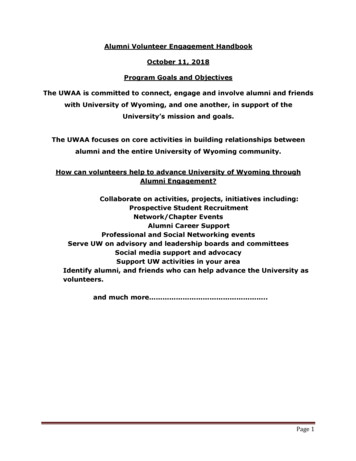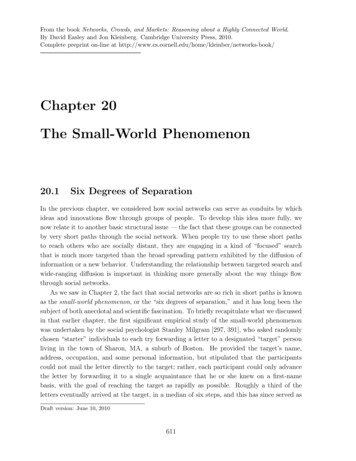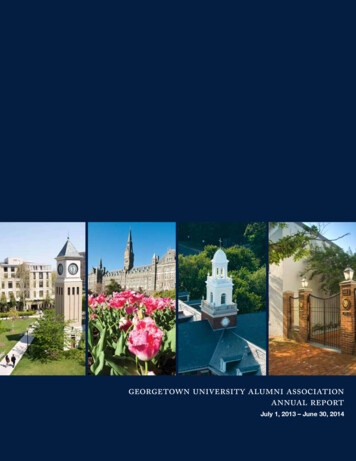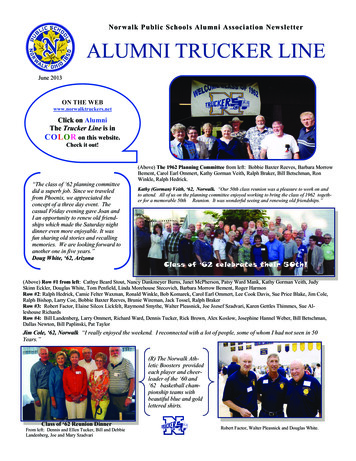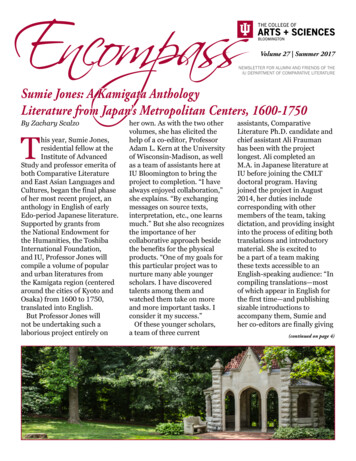
Transcription
Volume 27 Summer 2017NEWSLETTER FOR ALUMNI AND FRIENDS OF THEIU DEPARTMENT OF COMPARATIVE LITERATURESumie Jones: A Kamigata AnthologyLiterature from Japan’s Metropolitan Centers, 1600-1750By Zachary ScalzoThis year, Sumie Jones,residential fellow at theInstitute of AdvancedStudy and professor emerita ofboth Comparative Literatureand East Asian Languages andCultures, began the final phaseof her most recent project, ananthology in English of earlyEdo-period Japanese literature.Supported by grants fromthe National Endowment forthe Humanities, the ToshibaInternational Foundation,and IU, Professor Jones willcompile a volume of popularand urban literatures fromthe Kamigata region (centeredaround the cities of Kyoto andOsaka) from 1600 to 1750,translated into English.But Professor Jones willnot be undertaking such alaborious project entirely onher own. As with the two othervolumes, she has elicited thehelp of a co-editor, ProfessorAdam L. Kern at the Universityof Wisconsin-Madison, as wellas a team of assistants here atIU Bloomington to bring theproject to completion. “I havealways enjoyed collaboration,”she explains. “By exchangingmessages on source texts,interpretation, etc., one learnsmuch.” But she also recognizesthe importance of hercollaborative approach besidethe benefits for the physicalproducts. “One of my goals forthis particular project was tonurture many able youngerscholars. I have discoveredtalents among them andwatched them take on moreand more important tasks. Iconsider it my success.”Of these younger scholars,a team of three currentassistants, ComparativeLiterature Ph.D. candidate andchief assistant Ali Fraumanhas been with the projectlongest. Ali completed anM.A. in Japanese literature atIU before joining the CMLTdoctoral program. Havingjoined the project in August2014, her duties includecorresponding with othermembers of the team, takingdictation, and providing insightinto the process of editing bothtranslations and introductorymaterial. She is excited tobe a part of a team makingthese texts accessible to anEnglish-speaking audience: “Incompiling translations—mostof which appear in English forthe first time—and publishingsizable introductions toaccompany them, Sumie andher co-editors are finally giving(continued on page 4)
ContentsFrom the ChairDepartment News5Faculty News8Emeriti News13Alumni News14Graduate News16Grad Spotlight19Undergrad Spotlight21This newsletter is published bythe Department of ComparativeLiterature, with the College of Artsand Sciences, to encourage alumniinterest in and support for IndianaUniversity.For activities and membershipinformation, call (800) 824-3044or visit http://alumni.iu.eduDepartment of Comparative Literature(complit@indiana.edu)Department Chair . David HertzEditor . Daniel SullivanCollege of Arts & SciencesExecutive Dean . Larry SingellAssistant Deanfor Advancement . Travis PaulinDirector ofAlumni Relations . Vanessa CloeNewsletter Layout . Daniel McDeavittIU Alumni AssociationClass Notes Editor . Bill Elliott2This is my last letter fromthe chair, as I steppeddown from a veryrewarding four-year stint at theend of June. What a privilege ithas been to serve ComparativeLiterature from 2013-2017!I extend a warm welcome toProfessor Paul Losensky, ourincoming chair. He took up hisnew position as of July 1, 2017.I have every confidence that hewill be as enthusiastic aboutsupporting the ComparativeLiterature community as I havebeen, and he will be as eager tohear from you as well.One of the triumphs of thepast twenty-four months hasbeen a successful outsidereview of our department,which concluded with a finalconversation with our collegeleadership just after the endof the spring 2016 semester.While preparing for the event,we assembled a 700-page selfstudy of our unit and I learnedmuch about our colleagues andour fascinating history whileputting it all together. Specialthanks go to Rosemarie McGerrand Sarah Van der Laan fortheir dedicated help with thislabor and also to all the othercolleagues who participatedin assembling our materials.We made new friends whilegoing through the process—comparative literature scholarsPeggy McCracken (Universityof Michigan) and JohnHamilton (Harvard) were ourexternal evaluators—and wevery much enjoyed workingwith them.Studying our field for ourreview made me think onceagain about how open tothe world IU ComparativeLiterature has been all along,and how tremendouslyimportant this aspect of thediscipline remains in an eraplagued by alarming newtypes of xenophobia. Thisyear the applicant pool for ourgraduate program includedstudents from eight countriesin addition to the U.S.—Algeria,Belarus, China, Iran, Mexico,Norway, Poland, and theUkraine. This in itself is awonderful statement about theinternational significance ofcomparative literary studies,and it reminds us that peoplefrom all around the worldare interested in coming toBloomington to study with us.As usual, I would like toselect a few highlights fromthe year. Eileen Julien,Akin Adesokan, and theircolleagues, supported by anNEH grant and many officesof the university, conducted asuccessful conference on Africalast summer. Eileen Julienand her collaborators hopeto continue this investigationin yet another conference tocome. In fall 2016, we putout a special edition of TheYearbook of ComparativeLiterature (vol. 59), whichhas been published by theUniversity of Toronto Pressfor some years. This issue wasdevoted to the thought of thelate and highly distinguishedMatei Calinescu. It is basedon a conference dedicated tohis work. A number of alumni,
who had worked with ProfessorCalinescu, contributed to thisvolume. I am sure that otherformer students of his and ofIU Comparative Literature ingeneral will enjoy reading thepapers published in this issue.At the end of 2016, SmithProvost Katherine Rowe, ourWertheim lecturer, made acase for a whole new range ofcomparative study of mediaplatforms that could andshould be incorporated intoour discipline. The lecture wasfollowed by a packed receptionin the University Club,attended by students, alumni,and friends of ComparativeLiterature.This spring brought us a newbook by Eyal Peretz, one of ourmost productive scholars. Hislatest work, which puts forth anew theoretical framework forunderstanding the historicalsignificance of film in relationto the history of the modernarts, is entitled The OffScreen: An Investigation of theCinematic Frame (StanfordUniversity Press, 2017).Willis Barnstone came backto Bloomington in the springof 2017 to give a memorabletalk and reading from Poetsof the Bible, his forthcomingNorton book of translationsof poetic jewels hidden inthe Greek and Hebrew texts.Many current graduatestudents enjoyed meetingthis prolific poet, translator,and scholar. His new book,already with fine advancenotices, will be officiallyreleased in June. Also, thisspring, Sumie Jones, professoremeritus in our departmentand now residential fellow atIU’s Institute for AdvancedStudy, published A TokyoAnthology: Literature fromJapan’s Modern Metropolis1850-1920, in a splendidpaperback edition from theUniversity of Hawaii Press.Professor Jones’s work hasalso been supported by NEHover the years and she has evenmanaged to fund several of ourgraduate students to help inpreparing this volume.My work on the NEH Councilcontinued through 2016-17(a fascination in itself), but I’dalso like to emphasize that ourfine scholars have won theirawards completely on theirown. I congratulate them. Iam completely recused fromall discussions of IU grantapplications.Turning to the comparatistsof the future, I would liketo publicly thank ClaireRiley, Zack Scalzo, and ourdepartment’s Student AdvisoryBoard as a whole. Today’s SABleaders are not only obviouslysmart and talented but they arealso an especially warm andwelcoming group of graduatestudents who are extendingtheir outreach to a newgeneration of undergraduatestudents who are choosing tomajor in our field. It has reallybeen rewarding to supporttheir many projects this year.I will be off on sabbaticalnext year, and I will miss thestimulating intellectual life ofour unit and the many relatedcultural activities here at IU.I wanted to leave our readerswith just a few examplesof the many activities thattake place in the culturallyrich community we share inBloomington these days.As always, please send usyour news. ComparativeLiterature has a long reach,extending all across the countryand around the world, and it isalways wonderful to hear aboutwhat you are doing and very,very important to us here inBloomington, Indiana.So do stay in touch.Sincerely,David M.Hertz,Professorand Chair ofComparativeLiterature3
Literature from Japan (cont.)English speakers access to aculture and literary traditionwhich have otherwise beenout of reach.” Of particularnote, she explains, is thediscussion-based approach toediting Jones encourages as theteam—comprised of specialistsin a variety of disciplinesincluding Japanese languageand literature, history,and translation studies—works through translationmanuscripts and theirintroductions: “I feel like ourprimary strength comes frombeing such a large and diversegroup of people, from variouslocations, age groups, and withmany different specializations.The dialogue this createsduring the revision processallows for a refined and skillfulfinal product.”Alan Reiser, also a Ph.D.student in ComparativeLiterature, is the most recentaddition to the team ofassistants. His fluency in theJapanese language is evidencedboth by a past career in Japanand the translations that hepresented at the fall 2016Ilinca Zarifopol JohnstonMemorial Colloquium. Hislinguistic skills make himan ideal Japanese-Languageand Bibliography Assistantto Professor Jones, a positionhe has held since June 2015.Charged with correspondingwith libraries, museums, andprivate collectors in Japan4regarding original versions oftexts, as well as maintainingand organizing many of thegraphic works incorporatedinto the volumes, Reiserappreciates not only the handson experience with translationand publication processes, butespecially values the rangeof works presented in theproject. “The project reflectsa vibrant, diverse creativity ofJapanese authors throughoutthese rich periods that has longbeen inaccessible in English,”he explains, adding, “I'veparticularly benefited fromwonderful conversations aboutintricacies of Japanese culturethat have arisen while sortingout details.”It is no surprise thatProfessor Jones’ team hasalways been comprisedof capable students, alarge proportion of thempursuing advanced degreesin Comparative Literature.Frauman considersComparative Literaturestudents to be among the mostqualified to assist with projectslike this: “They’re more likelyto have experience readingtexts from a variety of differentcultures and time periods andcan use that experience whendiscussing the translationsand introductions.” AndProfessor Jones agrees. “Ihave not consciously soughtout CMLT graduate students,but I generally favor them, ascomparatists are, by training,broad-minded,” she explains. “Ihave had great assistants fromother disciplines as well, butCimberli Kearns, Julia Whyde,Kristin Reed, and Sally Morrellstand out as great assistantswho were also CMLT students.My current assistants, eachwith a talent and expertiseof their own, form a perfectteam.”A Kamigata Anthology:Literature from Japan’sMetropolitan Centers, 16001750, to be finalized over thenext three years, will focus onworks concerning the citiesof Kyoto and Osaka and willfeature poetry, prose, drama,graphic narratives, and textsthat push against and betweengenres. This volume will jointhe well-reviewed An EdoAnthology: Literature fromJapan’s Mega City, 1750-1850(2009) and the forthcoming ATokyo Anthology: Literaturefrom Japan’s ModernMetropolis, 1850-1920 (2017),all published by the Universityof Hawaii Press, thanks tonewly won grants from theNational Endowment forthe Humanities, the ToshibaInternational Foundation, andIU.Zachary Scalzo is one ofthe two chief assistants toProfessor Jones for her EdoMeiji Anthology Project.He is a Ph.D. student in theDepartment of ComparativeLiterature and joined theproject in September 2015.
Eileen Julien: A ProfileInterviewed by Roy HollerEileen Julien is director of the Institutefor Advanced Study and a professor ofComparative Literature, French andItalian, and African Studies at IU Bloomington.She has written numerous articles and bookchapters, and is the author and co-editor ofseveral books, including a memoir, Travelswith Mae: Scenes of a New Orleans Girlhood(2009). Her article “The Extroverted AfricanNovel” (Moretti 2006), which challenges thestory of the “rise of the novel” and offers a theoryof why some African novels travel and othersdon’t, has created a lot of interest. Eileen hasreceived Guggenheim, Fulbright, and BuntingInstitute awards and a National Endowment forHumanities grant for the 2016 summer institute,“Arts of Survival: Recasting Lives in AfricanCities,” which brought 21 faculty and 3 graduatestudents to Bloomington from universities andcolleges across the U.S.Here are a few excerpts from my conversationwith Professor Julien.“This year was has been exhilarating andexhausting! In the best of times I am caughtbetween teaching, running the Institute forAdvanced Studies, and too many outsideprojects, a lot of which are wonderful! I am inthree departments, on the editorial board ofAfrica Today and Black Camera. Like everyonewho’s been around as long as I have, I amconstantly being asked to write for tenure cases,promotion cases, and reviews. I was in the UKfor a panel on “The Extroverted African Novel”in September, in Dakar for the 50th anniversaryof The World Festival of Black Arts in November,a good friend invited me to speak at HollinsUniversity in October—I couldn’t say no, and itwas a lot of fun—and I was invited to Milan tojoin the Accademia Ambrosiana. And that wasmy schedule only through January!I am the Africa Coordinator for the Literatureof World History. This is a lengthy, ten-yearcollaboration of writers from all over theworld, in four volumes covering six regions. Itis a comparative study of literature from “thebeginning.” I didn’t have to do this, but it is aproject that puts Africa at the table, starting withancient Egypt–not just in the 20thcentury postcolonial, anti-imperialistic context where Africausually shows up.I want to edit a book on my father’s letters. Myfather wrote letters to the editor for fifty yearsand some are fabulous. I want to write a bookon Kalidou Sy, my deceased husband, about theway he would paint in his studio and then comeinto the kitchen and cook, a paintbrush in onehand, a wooden spoon in the other. And I wantto write a book about the poetics of “Black Paris,”that cosmopolitan crossroads of early and midtwentieth century. Retirement, where are you?A student in my Intro to African Lits courseasked once if a novel we were reading was relatedto the things going on in the U.S. I smiled andlaughed and said, “I am afraid for my son, who is15, when he goes out on the street.” She lookedat me with enormous surprise and said, “butwhy?!” American schools have done a terriblejob educating our young people about Americanhistory. I think we have a big role to play, if wecan ever get it right.There is something joyful about swimming. Iam in my own world and I think thoughts, I getideas. I love the feel of the water going by, and5(continued)
the feel of my body like a machine, with all thepistons working, it clears my head.We want to give you money, give us a goodreason to do it. The Institute for AdvancedStudies has been around since 1981. It promotedcollaborative, interdisciplinary research withoutrequiring “results,” the idea being that facultyneed time to be creative without pressure. Nowwe have an additional mission, helping associateprofessors get to promotion. But I don’t wantthe IAS to be simply a cash register. So, we'vecreated residential fellowship programs and"promotion cohorts," where associate professorswork interdisciplinarily: comp lit professorstalking to biologists and historians talking topeople in informatics, who are talking to folks inthe Jacobs School of Music, all working togetherand helping each other create better researchprojects and promotion statements. We bringseasoned faculty to read and comment on theirprojects and statements. Our motto: a place forintellectual vitality and community!We have created other programs as well, likeour Summer Repository Research FellowshipProgram with IUB partners, like the KinseyInstitute, the Mathers Museum, the Archives ofTraditional Music, the Lilly Library, the BlackFilm Center, the Paleontology Lab, etc. Scholarsfrom the outside apply and sometimes they pairup with associate professors or other IU faculty.This program has gotten an incredible response.We are constantly trying to perfect and refine.Tell the truth. You decided to make anargument and halfway there, you realizesomething is not right, don’t keep going! Go backand start over. Tell the story that you know istrue, and in your words. Chinua Achebe said thistoo. Tell the story you can tell. Other people willhear you. Don’t write to please the crowd, don’twrite for your tenure committee, write for you.Submit, resubmit, resubmit, resubmit. If yourmanuscript doesn't get accepted the first time,try again and again and again. Also, you shouldnot write alone. You need other people giving youfeedback, helping you think it through. In myexperience, that's critical.If I could talk to one person, it would be JamesBaldwin. I teach him in the Black Paris courseand I have come to admire this man. I'd like toask him about France, about living abroad, abouthis complicated relationship with the U.S. I readhis work and say, oh, this is where X got hisidea and that is where Y got her idea! I admirehis frankness, his openness, he is so incisive.From my point of view, he didn’t get everythingright—who does?—but what a mind. And he wascourageous.The 2016 Albert Wertheim Lecture in Comparative DramaBy Rosemarie McGerrHow might we understand the relationshipbetween playgoer and playing space in anetworked world? This was the questionat the core of the 2016 Albert Wertheim Lecturein Comparative Drama, which took place onDecember 5 at the University Club, IndianaMemorial Union. Our guest speaker, Katherine6Rowe, Provost and Dean of the Faculty at SmithCollege, titled her presentation “Virtual GlobeTheatres (Playgoing in a Networked World).”Professor Rowe addressed the phenomenonof virtual Globe Theatres in gaming, socialnetworking, and other digital platforms andoffered the perspective of a scholar of earlymodern drama and media history whoseinnovative teaching and research explore the
history of reading, writing and performance,from the Renaissance to the digital age.Known for books such as Dead Hands:Fictions of Agency, Renaissance to Modernand New Wave Shakespeare on Screen,Professor Rowe is also co-founder of LuminaryDigital Media, a social reading platform thatis bringing literary works to mobile devices,including iPad apps of the Folger LibraryShakespeare editions. In addition, she is coeditor of The Cambridge Guide to the Worldsof Shakespeare, a transhistorical, international,and interdisciplinary study of the world in whichShakespeare and his contemporaries lived andwhat the world has made of Shakespeare as acultural icon over the past four centuries.Her topic for the Wertheim Lecture broughtan enthusiastic audience of students and facultyfrom the field of digital humanities, as well asthe language and literature departments andthe Department of Theatre, Drama, and ModernDance, who engaged with Professor Rowe in alively question period after her talk and duringthe reception that followed.On the next day, after Professor Rowe’s lunchwith CMLT graduate students, the departmentheld an interdisciplinary colloquium at theCollege Arts and Humanities Institute on“Virtual Globes: Comparative Drama and theDigital Humanities” in order to expand on issuesraised during Professor Rowe’s lecture. On thepanel of speakers, Professor Rowe joineddoctoral student Zachary Scalzo (CMLT) andfaculty members Sonia Velázquez (ReligiousStudies and CMLT), Ellen MacKay (English),Jennifer Goodlander (Theatre, Drama, andModern Dance), and Rosemarie McGerr(CMLT). Emeritus Professor Angela Pao(CMLT) moderated. After short presentationsfrom the panel, discussion continued withquestions and comments from the graduatestudents and faculty in the audience. ProfessorRowe commented afterward that she had notparticipated in this kind of follow-up event for alecture before and found it so productive that shewould recommend it to her faculty at Smith.The Wertheim Lectures in Comparative Dramacommemorate the work of Albert Wertheim,who was Professor of English, ComparativeLiterature, and Theatre and Drama and passedaway in April 2003. Professor Wertheim cameto IUB in 1969 with a doctoral degree in Englishliterature from Yale University (1965) andparticular interests in Elizabethan, Jacobean,and Caroline drama and 20th-century Europeanand American modern drama. Over the years,the scope of his research grew to include awide range of postcolonial literatures, with aspecial focus on the work of Athol Fugard. Hisscholarly publications include over fifty articles;five co-edited anthologies on contemporaryBritish, American, and postcolonial drama andfiction; and two books—The Dramatic Art ofAthol Fugard: From South Africa to the World(2000) and Staging the War: American Dramaand World War II (2004). One of ProfessorWertheim’s major contributions to the study ofcomparative drama at IU was his instrumentalrole in helping to bring the papers of AtholFugard to the Lilly Library, where they arepreserved and accessible for enhancing bothscholarship and performance.Our department’s goal in this lecture series hasbeen to host a comparative drama speaker forenough time to engage with students and facultyin several ways, which we believe reflects thelegacy of Professor Wertheim. The department isvery grateful to Judy Wertheim, Ted Widlanski,and Martha Jacobs for the generous support thatmakes these events possible.7
icanLiteraturein theWorld: ATeacher’s Report,” in PMLA,131.5 2016; a short story titled“We Deserve A Share of OurKinsman’s Money” in Glänta3-4: 15, 2016 (originally inSwedish); a translation titled“In A Polygamous Home,”(excerpted from his translationof the Yoruba novel, Aye D’AyeOyinbo, by Isaac Delano)in Imagine Africa 3; andcontributed a chapter on“African Anti-Colonialism”in The Encyclopedia ofPostcolonial Studies, BlackwellPublishing, BlackwellReference Online 2016. Hewas invited to the PrincetonInstitute for International andRegional Studies, where hegave a lecture titled “ColonialCapital or African City?:Emergent Publics in Lagos,”on November 17. On April8, he was invited to speak ata symposium at ColumbiaUniversity, titled “OtherDesires: The African City,” anda participant (by Skype) at theIU Rework Symposium, IUGateway/Humboldt Universityin Berlin on March 11. Hewas a seminar leader at theNEH Summer Institute “Artsof Survival: Recasting Livesin African Cities” held on theIU campus (July 6-26). Healso contributed a competitive8paper, “Raoul Peck:Filmmaker, African,” during aconference titled Iconographyof Patrice Lumumba andthe Work of Raoul Peck, atAntwerp University, Antwerp,Belgium, February 18-19, andanother titled “From PoliticalPamphlets to Concert PartyTheaters: Lagos ConsumingPublics,” during the AfricanLiterature Association AnnualConference in Atlanta, Georgia,on April 7.JacobEmeryJacobEmerypublishedtwo articlesin the lastyear. One,“Speciesof Legitimacy: The Rhetoricof Succession around RussianCoins” (Slavic Review,Spring 2016), dates backto work he did in graduateschool; the other, “SigizmundKrzhizhanovksy’s Poetics ofPassivity” (Russian Review,January 2017), relates to theOctober 2016 conferencehe organized at IU togetherwith Alex Spektor, “Plantingthe Flag: The Nonfiction ofSigizmund Krzhizhanovsky.”In addition to opening thisconference, Emery participatedin the faculty roundtable at theIU symposium “Thinking withJacques Derrida,” presentedwork in progress at ASEESin Washington D.C., at the“Radiant Futures” symposiumhosted by NYU’s Jordan Center,at the “Passive Resistance”conference at IU’s gatewaycampus in India, and gave aninvited talk on Nabokov atPrinceton University. Amongpublications scheduled toappear in 2017 are his bookAlternative Kinships: Economyand Family in RussianModernism (Northern IllinoisUniversity Press); the articles“Custom House of Hades: WhyDickens and Gogol Traffic withthe Underworld” (Yearbookof Comparative Literature)and “Romantic Aesthetics andCybernetic Fiction” (in TheRussian Posthuman, editedColleen McQuillen and JuliaVaingurt); and a review of LarsKleberg’s Vid avantgardetskorsvägar: om Ivan Aksionovoch den Ryska modernismen(Slavic and East EuropeanJournal). In 2017 we willalso see the reprinting of his2008 PMLA article “Kinshipand Figure in Andrei Bely’sPetersburg” in a centennialanthology of scholarshipon Bely’s Petersburg andthe publication in Russiantranslation of his 2014 article“A Clone Playing Craps WillNever Abolish Chance” forNovoe literaturenoe obozrenie.At the moment, Emery is coediting (with Tamar Abramov,Julia Bekman-Chadaga,Julia Vaingurt, and CristinaVatulescu) the Svetlana BoymReader, currently underreview. He has also receivedfunding for a Spring 2017research leave through theCollege Arts & HumanitiesInsititute and New Frontiersfoundations to complete hissecond book, which dealswith Romantic aesthetics andtheir evolution in relation toinformatics technologies.
FacultyNewsDavidHertzAmong thehighlightsfrom thepast year,ProfessorHertz gavea talk on“Nostalgia, Theory and theArts,” at the ACLA, which tookplace at Harvard Universityin March 2016. He had thepleasure of contributingto a three-day series ofpresentations organized by IUalumna Claire Chen for theoccasion. He also continued toserve on the NEH Council inWashington D.C. In September,he attended the White Houseceremony for the Arts andHumanities medalists. Whilethere, he joined with NEHcolleagues to shake hands withPresident Obama and pose fora photo.BillJohnstonIn May2016, BillJohnstonwasawardedtheFound inTranslationAward for his translationof Tomasz Różycki’s mockepic poem “Twelve Stations”(Zephyr Press, 2015). InJanuary 2017, Johnstonpublished “English Teachingand Evangelical Mission,”an ethnographic study of anevangelical-run languageschool in Poland. Later thisyear “Oxygen,” a selectionof Julia Fiedorczuk’s poemstranslated by Johnston, willbe published by Zephyr Press.Johnston is completing workon Adam Mickiewicz’s “PanTadeusz,” Poland’s nationalepic, which will be published in2018 by Archipelago Books.Eileen JulienIn spring 2016, Eileen Julienpresented the paper “‘OnDavid Hertz (second from right) attends the 2015 National Humanities Medalceremony at the White House.Duality’: InHonor ofProfessorBiodunJeyifo” atthe annualmeeting ofthe AfricanLiteratureAssociationin Atlanta and moderateda discussion at the annualmeeting of the ConseilInternational d’EtudesFrancophones in Senegalon “Challenges in theContemporary Arts in Senegal,”featuring Senegalese writerKen Bugul and Senegalesefilmmaker Angèle Diabang.in November she presented“Pre-négritude ModernitiesIn Writing; Post-négritudeModernities in Painting”at a symposium in Dakar,Senegal, commemorating thefiftieth anniversary of the FirstWorld Festival of Black Artsheld in Dakar in 1966. Julienwas a discussant on a panelon “African Literature andUniversality” at the AfricanStudies Association meetingin Washington in December.She was a respondent to aset of papers focusing on herpublication of some yearsago, “The Extroverted AfricanNovel,” during the meeting ofthe African Studies Associationof the U.K. in September, andin October she was invited tospeak at Hollins University,where she presented “Loss,Love and the Art of MakingGumbo.” In January, she wasinducted into the AfricanStudies Class of the AccademiaAmbrosiana in Milan. The9(continued)
Locations and Dislocations ofAfrican Literature: A DialogueBetween Humanities andSocial Science Scholars, coedited by Julien and BiodunJeyifo, appeared in spring2016. Julien continues to serveas Director of the IU Institutefor Advanced Study.PaulLosenskyPaultraveled toSouthernCaliforniafrequentlyin thespringof 2016 to participate inseminars at UC Irvine andUCLA and to deliver alecture at UCLA. He spokeon biographical writing andpoetics in early modern Persianliterature. He also spoke atthe University of Michiganin the fall and lectured onthe connections betweenpoetry and architecture inthe work of the contemporaryIranian-American sculptorand architect Siah Armajaniat the Kemper Museum ofContemporary Art in KansasCity. Together with BillJohnston, he published anaccount of IU’s Certificateof Literary Translation(“A Graduate Certificatein Translation Studies”)in Teaching Translation:Programs, Courses,Pedagogies, ed. LawrenceVenuti (New York: Routledge,2017). He contributed anarticle to EncyclopaediaIranica on the Indo-Persianpoet Zohuri Torshizi andsubmitted translations of10selected poems by the 16thcentury poet MohtashamKashani for an upcominganthology entitled Empiresof the Near East and India:Sources for the Study ofSafavid, Ottoman, and MughalSocieties, ed. Hani Khafipour.He also chaired the jury forthe Roth Award Committeefor Literary Translation fromPersian.DanielLukesIn February2017,DanielLukes’ bookTriptych:ThreeStudies ofManic Street Preachers’ TheHoly Bible, a collaboration withRhian E. Jones and LarissaWodtke, was published byRepeater Books. His section ofthe book analyzes the literaryinfluences of the landmark1994 rock album. In
comparative literature scholars Peggy McCracken (University of Michigan) and John Hamilton (Harvard) were our external evaluators—and we very much enjoyed working with them. Studying our field for our review made me think once again about how open to the world IU Comparative Literature has been all along, and how tremendously

